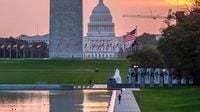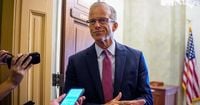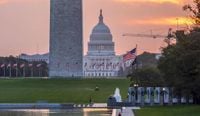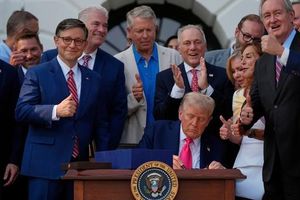As the clock ticks down to a looming government shutdown, the White House is bracing for a high-stakes showdown. On Monday, September 29, 2025, President Donald Trump is set to meet with the top four congressional leaders—Senate Minority Leader Chuck Schumer, House Minority Leader Hakeem Jeffries, Senate Majority Leader John Thune, and House Speaker Mike Johnson—in a last-ditch attempt to keep the government’s doors open. But with both sides entrenched in their positions, the prospects for a breakthrough look dim, and the blame game is already in full swing.
If Congress fails to pass a funding bill by Tuesday night, September 30, government offices across the country will shutter, and nonexempt federal employees will be furloughed. The House, controlled by Republicans, has already passed a stopgap bill to keep funding at current levels for seven more weeks while lawmakers hammer out annual spending plans. But the Senate’s 60-vote threshold means at least eight Democrats must support the measure, given that Republican Senator Rand Paul has vowed to oppose it. So far, Democrats are holding firm, using the threat of a shutdown as leverage to demand action on health care—specifically, an extension of Affordable Care Act (ACA) tax credits that subsidize insurance for millions and are set to expire at the end of the year.
President Trump, for his part, has shown little inclination to compromise. According to the Associated Press, he’s repeatedly insisted, “If it has to shut down, it'll have to shut down, but they're the ones shutting down government.” Trump has taken to blaming Democrats for the impasse, labeling their demands as “ridiculous” and accusing them of holding the government hostage over health care. His administration has gone a step further, warning that this shutdown could trigger not just furloughs but permanent layoffs for federal workers—a move that would shrink the government in line with Trump’s long-standing policy goals.
Republican leaders are standing shoulder-to-shoulder with the president. House Speaker Mike Johnson and Senate Majority Leader John Thune have refused to include health care provisions in the funding bill, arguing that Democrats’ demands are too costly and complex to negotiate under the threat of a shutdown. On NBC’s “Meet the Press” Sunday, Thune declared, “Whether the government shuts down this week is totally up to the Democrats.” He pressed Democrats to pass the funding bill and debate health care later, insisting, “Chuck Schumer said a few months ago that a government shutdown would be chaotic, harmful and painful. He's right, and that's why we shouldn't do it.”
But Democrats aren’t budging. They contend that Republicans, who control both the White House and Congress, will bear the brunt of the blame if the government closes its doors. Schumer, speaking on the same Sunday show, described the upcoming White House meeting as “a first step, but only a first step. We need a serious negotiation.” He emphasized that Democrats’ focus is on health care, not political pressure from their base. “There is going to be huge pressure on Republican senators, congressmen, and even Trump to do something about this horrible health care crisis,” Schumer said.
At the heart of the standoff are the ACA tax credits, which have made marketplace insurance more affordable for millions of Americans since the COVID-19 pandemic. Democrats argue that letting these credits expire would devastate low- and middle-income families and saddle hospitals with an estimated $7.7 billion spike in uncompensated care, according to recent analysis cited by Axios. They also want to reverse Medicaid cuts made in this year’s GOP tax and border spending bills. “We're hearing from the American people that they need help on health care,” Schumer said, adding that threats of mass layoffs are a “smoke screen” for the administration’s real agenda.
Republicans, however, maintain that Democrats are “hijacking” the process for political gain. Thune accused them of trying to “motivate their base” and warned that negotiating health care under a shutdown threat is irresponsible. Johnson, appearing on CNN’s “State of the Union,” insisted that President Trump “wants to do right by the people” and called on Democratic leaders to act responsibly. He also claimed—incorrectly, as noted by Axios—that Schumer wants to reinstate free health care for undocumented immigrants paid for by taxpayers. In reality, undocumented immigrants are not eligible for federally funded health coverage.
The tension has been brewing for weeks. Last week, Trump agreed to a meeting with Schumer and Jeffries, only to abruptly cancel after Johnson and Thune cautioned against negotiating with Democrats during the funding fight. Trump then blasted Democrats’ demands as “unserious and ridiculous” on social media, before reversing course again and rescheduling the meeting under mounting pressure from both parties. According to the Associated Press, Schumer privately urged Thune to help secure a meeting with the president as the funding deadline loomed. A Thune spokesman responded that Schumer was “clearly getting nervous.”
Democrats say the White House’s willingness to meet shows the GOP is feeling the heat. “They felt the heat,” Schumer argued, pointing to Trump’s agreement to sit down with congressional leaders as evidence. Minority Leader Hakeem Jeffries echoed this sentiment on ABC’s “This Week,” stating that Democrats are seeking “bipartisan common ground” but remain committed to addressing what he called “the Republican health care crisis.”
Meanwhile, Trump’s administration is preparing for the worst. An Office of Management and Budget memo last week directed agencies to consider reductions in force—not just furloughs—for programs whose funding would lapse and are “not consistent” with the president’s priorities. This approach, which would permanently eliminate federal jobs, marks a sharp escalation from the temporary furloughs of past shutdowns. Jeffries accused Trump and his aides of using “the smoke screen of a government shutdown caused by them to do more damage.”
The stakes are high and the risks are real. If the shutdown goes ahead, it will be the third major funding lapse of Trump’s presidency—each one marked by bitter partisanship and finger-pointing. Negotiations between Trump and Democratic leaders have rarely ended well, with past talks devolving into social media spats and canceled meetings. The last shutdown, in late 2018, dragged on for a record five weeks before lawmakers finally struck a deal.
As lawmakers file into the White House, Americans across the country are left wondering: Will their government open for business on Wednesday morning, or will political brinkmanship once again leave them in the lurch? With both sides digging in, the answer may not come until the very last minute.
With the deadline fast approaching and neither party showing signs of blinking, Washington finds itself at a familiar crossroads—one where the stakes are not just political, but profoundly personal for millions of Americans.






